

Digital Citizenship in the Time of “Instant Celebrity” I have to admit it…I could watch Vine videos all day.
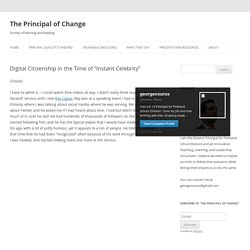
I didn’t really think much of the “6 Second” service until I met Ray Ligaya. Ray was at a speaking event I had in Waterloo, Ontario, where I was talking about social media, where he was serving. We started talking about Twitter and he asked me if I had heard about Vine. I had but didn’t really think much of it, until he told me had hundreds of thousands of followers on the service. I started following him, and he has the typical videos that I would have made when I was his age, with a lot of potty humour, yet it appeals to a ton of people. What I had noticed was that a lot of the popular Vine accounts were created by teenagers. Talking about this with my friend Chris Wejr, he asked the question, “what would it be like to grow up as a kid today?
While Alex is clearly enjoying some of the attention, he and his family have also had to deal with more serious consequences of web fame. This is not just kids mind you,but adults as well. — iKeepSafe. iKeepSafe would like to thank the many experts who contributed to Copyright & Creativity for Ethical Digital Citizens.
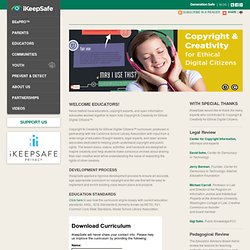
Legal Review Center for Copyright Information,attorneys and experts David Sohn, Center for Democracy in Technology Jerry Berman, Founder, Center forDemocracy in Technology; Internet Education Foundation Michael Carroll, Professor of Law and Director of the Program on Information Justice and IntellectualProperty at the American University,Washington College of Law, Creative Commons co-founderand board member Gigi Sohn, Public Knowledge/FCC Pedagogical Review The Education Advisory Board met to review the lessons for teaching methods, age appropriateness, and relevance to the education community. Digital Literacy and Citizenship Curriculum – Know your web – Good to Know – Google.
At Google we believe in the power of education and the promise of technology to improve the lives of students and educators -- leading the way for a new generation of learning in the classroom and beyond.
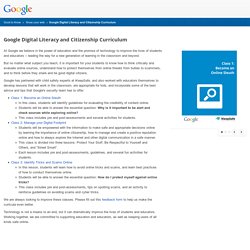
But no matter what subject you teach, it is important for your students to know how to think critically and evaluate online sources, understand how to protect themselves from online threats from bullies to scammers, and to think before they share and be good digital citizens. Google has partnered with child safety experts at iKeepSafe, and also worked with educators themselves to develop lessons that will work in the classroom, are appropriate for kids, and incorporate some of the best advice and tips that Google's security team has to offer. Class 1: Become an Online Sleuth In this class, students will identify guidelines for evaluating the credibility of content online. We are always looking to improve these classes.
Digital footprint. One of the great things about being online is the ability to share videos and photos with your friends and seeing their response.
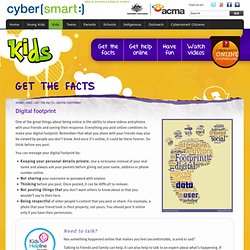
Everything you post online combines to make your digital footprint. Remember that what you share with your friends may also be viewed by people you don’t know. And once it’s online, it could be there forever. So think before you post. You can manage your digital footprint by: Keeping your personal details private. Need to talk? Has something happened online that makes you feel uncomfortable, scared or sad?
Awesome Digital Citizenship Graphic for your Classroom. Digital citizenship is " the norms of appropriate, responsible behavior with regard to technology use.

"It is the combination of technical and social skills that enable a person to be successful and safe in the information age. Just like literacy and numeracy initiatives which provide people with the skills to ' participate in the work force, digital literacy has become an essential skill to be a confident, connected, and actively involved life long learner.' I personally recommend that teachers and educators should, throughout the entire school year, devote special sessions to just teaching students about Digital Citizenship. Students need to learn how to act appropriately while using the net and there are several activities and resources to help you do that with them.
Check out this section to access some of these resources. I am also sharing with you today a great graphic on the components of digital citizenship.Try out printing it and using it with your students in the classroom. Five-Minute Film Festival: Teaching Digital Citizenship. "Digital citizenship" is an umbrella term that covers a whole host of important issues.
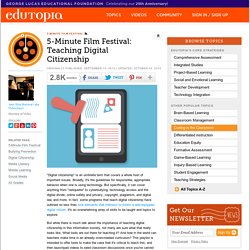
Broadly, it's the guidelines for responsible, appropriate behavior when one is using technology. But specifically, it can cover anything from "netiquette" to cyberbullying; technology access and the digital divide; online safety and privacy; copyright, plagiarism, and digital law, and more. In fact, some programs that teach digital citizenship have outlined no less than nine elements that intersect to inform a well-equipped digital citizen. It's an overwhelming array of skills to be taught and topics to explore.
But while there is much talk about the importance of teaching digital citizenship in this information society, not many are sure what that really looks like. Video Playlist: Teaching Digital Citizenship Watch the player below to see the whole playlist, or view it on YouTube. Digital Literacy and Citizenship Classroom Curriculum. - Teachable Moments for Digital Citizenship. Digital-ID - home.